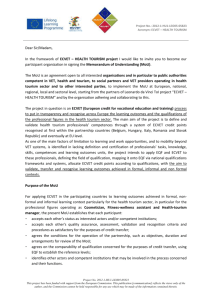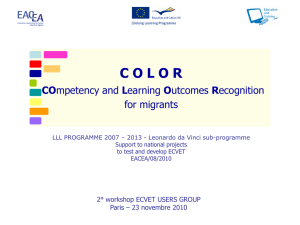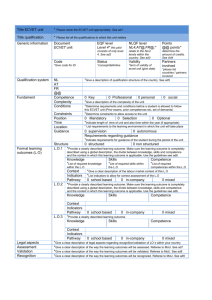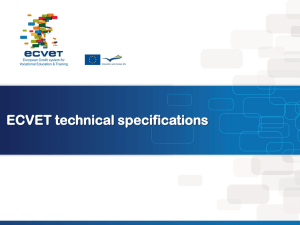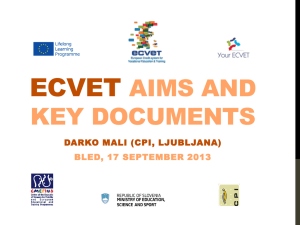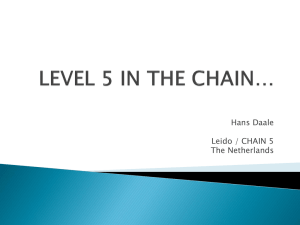Infopack - agroecvet.eu
advertisement
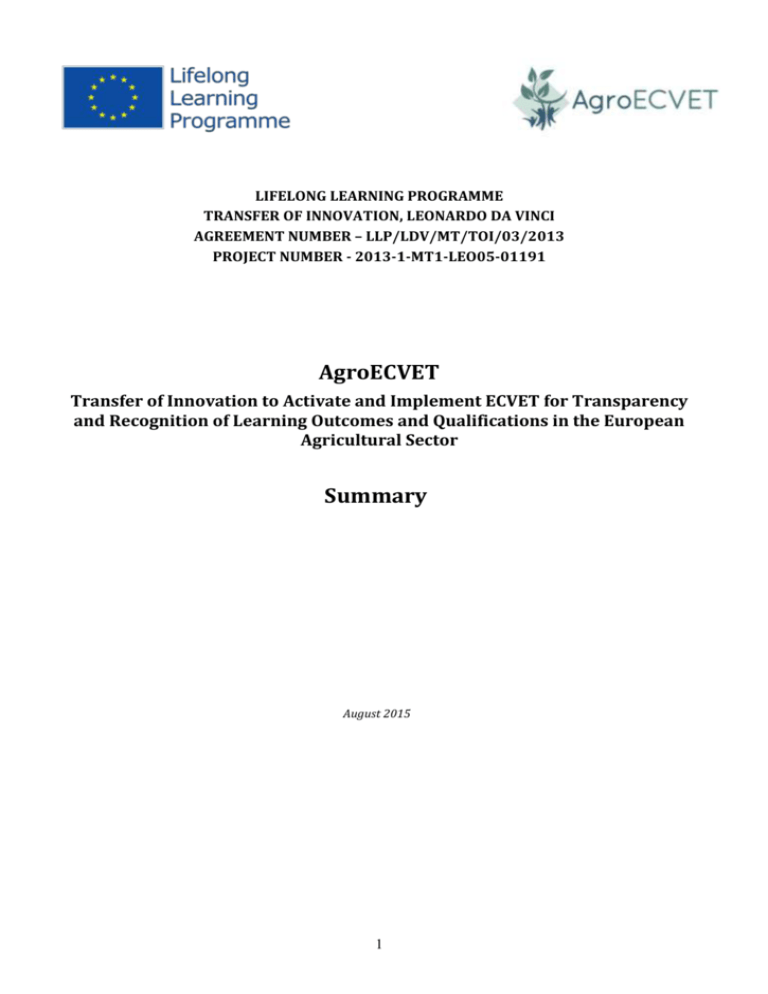
LIFELONG LEARNING PROGRAMME TRANSFER OF INNOVATION, LEONARDO DA VINCI AGREEMENT NUMBER – LLP/LDV/MT/TOI/03/2013 PROJECT NUMBER - 2013-1-MT1-LEO05-01191 AgroECVET Transfer of Innovation to Activate and Implement ECVET for Transparency and Recognition of Learning Outcomes and Qualifications in the European Agricultural Sector Summary August 2015 1 INDEX Premise 3 Section A – Purposes, Participants, Effectiveness of the MoU 5 Section B – ECVET Credits New European common professional qualification 8 Section C - Common European Model for Learning Agreements ECVET 10 2 Premise The “AgroECVET - Transfer of Innovation to Activate and Implement ECVET for Transparency and Recognition of Learning Outcomes and Qualifications in the European Agricultural Sector” multilateral project for transfer of innovation (MP ToI), which is underway within the sectoral programme Leonardo da Vinci of the EU Lifelong Learning Programme 2007-13, was designed to achieve the general objectives mentioned above whit particular reference to the agriculture sector, focusing on putting in transparency and recognition of agricultural sectoral learning outcomes and qualifications, particularly of those relating to managerial and entrepreneurial competences. The project is financed within the Priority “ECVET for transparency and recognition of learning outcomes and qualifications” (LEO-TraInno-11)” of the Leonardo da Vinci MP ToI projects 2013 call, and as such it is aimed to apply the European tools and frameworks EQF, ECVET, and Europass to put in transparency and recognise across Europe the learning outcomes and the qualifications of agricultural sector, particularly through the establishment of a MoU ECVET defining the qualification field in terms of learning outcomes, mapping it onto the EQF via national and regional qualifications frameworks and systems, designing qualification in transferable units of learning outcomes with allocation of credit points, and by means of its enforcement (Learning Agreements, Credits Awarding, Transfer Validation and Accumulation) through related VET and programmes with flexible devices for validation, transfer and recognition of learning outcomes achieved in formal, informal and non formal contexts, also mainstreaming and multiplying these results. The project Consortium includes important VET providers, social partners, and also SMEs, operating in agricultural sector at national, regional and local level (in Malta, Koperattivi Malta; in Italy, Aris Formazione e Ricerca Societa Cooperativa, Consorzio ITACA, and Associazione Nazionale Cooperative Agroalimentari Umbria; in Hungary, EBC*Licensing Magyarország Kft; in Spain, Fundación Ecoagroturismo; in Greece, Hellenic Management Association), and public institutions competent in VET at national and regional level (in particular, the Maltese National Commission for Further and Higher Education, and the Italian Regione Umbria), as well as European communication specialised organisations, like the Belgian Diesis Coop scrl-fs. The project is aimed to apply ECVET to learning outcomes and qualifications of agriculture sector, through development, testing and implementation of a new European sectoral qualification system focused on managerial and entrepreneurial competences and incorporating EQF, ECVET and Europass, able to overcome fragmentation of territorial (national and also regional, if regions are competent in VET matter) qualifications systems. At this aim are foreseen following specific objectives: - to analyse sustainable agriculture jobs in European VET systems, classifying them within EQF across participating countries, and identify a common perimeter to activate ECVET process; - to define an action plan to activate an ECVET process, starting from collection, analysis, adaptation of already realised best practices on transparency and recognition of competences and qualifications, and on ECVET process activation; - to design new common European qualifications in terms of activities/tasks/competences/learning outcomes units/ECVET credits; - to define and formalise (partners and competent/interested organisations) a Memorandum of Understanding - MoU ECVET for commonly recognised qualification/s, - to define and formalise (by professionals interested to qualification, concerned enterprises, VET providers) ECVET Learning Agreements describing, in compliance with MoU, training processes in formal/informal/non formal contexts, and related ECVET credits to be obtained 3 - to establish standards for quality testing to draft experimental training on ICT, sustainable agriculture, organic farming to establish a procedure for accreditation, also utilising Europass Certificate Supplement to disseminate project results and outputs to key actors, providing at EU level open information and supporting resources on activated ECVET process. As yet, the project implementation process has been centred on the preparation of the useful documentation at the aim of the Memorandum of Understanding – MoU signature, particularly the design of the new European common professional qualification standard in the agricultural sector focused on not-academic managerial and entrepreneurial competences, defined in a shared way during workpackage 3 starting from the common professional perimeter of figures, profiles and qualifications in agriculture sector in participating Countries, and following the guideline to be used by the partners to activate and develop the ECVET process defined within the workpackage 2 on the basis of relevant experiences and best practices in terms of approaches, activities and tools, collected, analysed and selected at this aim. In particular, the project activities has until now allowed the definition of a trans-national document, shared by all the participating European partners, which describes in terms of activities, tasks, skills and knowledge, units of learning outcomes and correspondence between units and associated ECVET credit points, the new European common professional qualification standard for not-academic managerial and entrepreneurial competences in agriculture (see Appendix 1 of this MoU). 4 Section A – Purposes, Participants, Effectiveness of the MoU Memorandum of Understanding ECVET for the new European common professional qualification in agriculture sector According to the 2009 EU Recommendation, ECVET is a technical framework for the transfer, recognition and, where appropriate, accumulation of individuals’ learning outcomes with a view to achieving a qualification. ECVET tools and methodology comprise the description of qualifications in terms of units of learning outcomes with associated points, a transfer and accumulation process and complementary documents such as learning agreements, transcripts of records and ECVET users’ guides. ECVET is intended to facilitate the recognition of learning outcomes in accordance with national legislation, in the framework of mobility, for the purpose of achieving a qualification. It should be noted that ECVET does not imply any new entitlement for citizens to obtain the automatic recognition of either learning outcomes or points. Its application for a given qualification is in accordance with the legislation, rules and regulations applicable in the Member States The ECVET common European tools belong to a series of European initiatives, including the European Credit Transfer and Accumulation System (ECTS), Europass, the European Quality Charter for Mobility (EQCM), the European principles for the identification and validation of non-formal and informal learning and the European Qualification Framework for lifelong learning (EQF). ECVET does not apply to the mutual recognition of qualifications in the area of regulated professions, as that is ensured by Directive 2005/36/EC of 7 September 2005, because ECVET is not a tool for granting rights to migrants in recognition of their qualifications acquired in one Member State with a view to exercising a regulated profession in another Member State. In such a case, only the Directive imposes legally binding obligations on Member States' authorities. For the purposes of the Memorandum of Understanding - MoU, the definitions which apply are the following: a) "Qualification": a formal outcome of an assessment and validation process which is obtained when a competent institution determines that an individual has achieved learning outcomes to given standards; b) "Learning outcomes": statements of what a learner knows, understands and is able to do on completion of a learning process and which are defined in terms of knowledge, skills and competence; c) "Unit of learning outcomes" (unit): a component of a qualification, consisting of a coherent set of knowledge, skills and competence, that can be assessed and validated; d) "Credit for learning outcomes" (Credit): individuals' set of learning outcomes which have been assessed and which can be accumulated towards a qualification or transferred to other learning programmes or qualifications; e) "Competent institution": the institution which is responsible for designing and awarding qualification or recognising units or other functions linked to ECVET, such as allocation of ECVET points to qualifications and units, assessment, validation and recognition of learning outcomes, under the rules and practices of participating countries; f) "Assessment of learning outcomes": methods and processes used to establish the extent to which a learner has in fact attained particular knowledge, skills and competence; 5 g) "Validation of learning outcomes": the process of confirming that certain assessed learning outcomes achieved by a learner correspond to specific outcomes which may be required for a unit or a qualification; h) "Recognition of learning outcomes": the process of attesting officially achieved learning outcomes through the awarding of units or qualifications; i) "ECVET points": a numerical representation of the overall weight of learning outcomes in a qualification and of the relative weight of units in relation to the qualification. Participants The MoU is an agreement open to all the interested organisations and in particular to public authorities competent in VET and agriculture issues, to social partners and VET providers operating in agricultural sector, and to other parties interested to implement it at European, national, regional, local and sectoral level, starting from the partners of the Leonardo da Vinci MP ToI project “AgroECVET” and the stakeholders of them. Purpose of the MoU For applying ECVET in the participating Countries to learning outcomes achieved in formal, non-formal and informal learning context, relating to concerned managerial and entrepreneurial competences in agriculture, this MoU establishes that each participant: - accepts each other’s status as interested actors and/or competent institutions; - accepts each other's quality assurance, assessment, validation and recognition criteria and procedures as satisfactory for the purposes of credit transfer; - agrees the conditions for the operation of the partnership, such as objectives, duration and arrangements for review of the MoU; - agrees on the comparability of qualification concerned for the purposes of credit transfer, using EQF to establish the reference levels; - identifies other actors and competent institutions that may be involved in the process concerned and their functions; Ratification and effectiveness of the MoU This MoU has been duly executed and signed by an official representative of each of signatories. MoU shall come into effect for each party from the date of its signature. This MoU and its Appendixes shall be executed in English and in the national languages of the signatories. This MoU includes two Appendixes: - Appendix 1, describing in terms of activities, tasks, skills and knowledge, units of learning outcomes and correspondence between units and associated ECVET credit points, the new European common professional qualification standard in the agricultural sector for not-academic managerial and entrepreneurial competences; - Appendix 2, meant to outline the mechanisms for the implementation of the MoU. 6 AgroECVET Transfer of Innovation to Activate and Implement ECVET for Transparency and Recognition of Learning Outcomes and Qualifications in the European Agricultural Sector Memorandum of Understanding ECVET for the new European common professional qualification in agriculture sector MoU Adhesion Signature Place: Date: Name of the organisation: Address of the organisation: Country: Telephone number: Fax number: E-mail: Legal representative: Stamp: Signature: _______________________________ 7 Section B – ECVET Credits New European common professional qualification Design of the new European common professional qualification in agricultural sector in terms of activities, tasks, knowledge, skills, competences, units of learning outcomes and related ECVET credits During the 2nd transnational project meeting (Perugia - Italy, 6th and 7th May 2014), the AgroECVET partners have shared a common approach to organise the activities of work package 3, aimed both to define a new European common professional qualification standard in the agricultural sector for the professional perimeter shared during work package 2, designed in terms of knowledge, skills, and competences, units of learning outcomes and related ECVET credits characterising the professional standard, and to allow for the definition and formalisation, by the partners and by other key actors involved in the agricultural sector VET systems in European participating countries (particularly, VET providers and social partners in the agricultural sector, and regional/national public institutions having competence on agriculture and on VET) of a Memorandum of Understanding ECVET formalising the common professional standard. It’s to remark that the professional perimeter shared at this aim, it includes all the professional field in agriculture sector concerned by managerial and entrepreneurial competences, with limitation to the figures classified within the EQF level 5 and lower. The activities have then proceeded following the strategies, methods, activities and tools to be used by the partners to activate and develop the ECVET process already shared by the partners within the work package 2 on the basis of best practices collected, analysed and selected for this ECVET process. In particular, the partners have firstly shared a general setting of the qualification design work, establishing 2 main competence areas for the new European common professional qualification standard in the agricultural sector focused on not-academic managerial and entrepreneurial competences, that is: a) Competences / units of learning outcomes and ECVET credits common to all participating countries; within this competence area was also evidenced both an area of entrepreneurial transversal competences, not specific for the agriculture sector, and an area of agriculture sector specific entrepreneurial competences; b) competences/units of learning outcomes and ECVET credits specific for each country. According to this articulation of the competences of concerned professional standard, the partners have proceeded with the shared definition of activities, tasks, skills, knowledge, units of learning outcomes/competences and ECVET credits for each one of these main competence areas, by means of a common tool specifically elaborated at this aim. Utilising this common tool, the partners have designed the new European common professional qualification standard for not-academic managerial and entrepreneurial competences in agriculture, also defining - in consideration of the diversified national contexts - specific national “addenda”, particularly on competences related to national rules and linguistic and cultural specificities. It’s to remark that main references for the 8 qualification design have been constituted by the NQF and RQF of European countries and regions, also not participating to the project (e.g., the SFEDI UK National Occupational Standards for Business Enterprise, particularly for entrepreneurial competences not specific for the agriculture sector). In the following pages is presented the new European common professional qualification standard in the agricultural sector for not-academic managerial and entrepreneurial competences, articulated following the main characteristic competence areas, as resulting from the project work. The contents of the first competence area, articulated in entrepreneurial transversal competences not specific for the agriculture sector, and in agriculture sector specific entrepreneurial competences, are commons to all participating countries. The contents of the second competence area are articulated in several national “addenda” (namely, an “addendum” for every participating country). The total ECVET credits are 60, of which 50 common to all participating countries (25 for transversal competences; 25 for sectoral competences), and 10 specific for each country. ECVET Credits Recapitulation Table (common and specific for countries) ECVET credits Section A – ECVET credits common to all participating countries 50 Section B – ECVET credits specific for each participating country 10 Total 60 9 Section C - Common European Model for Learning Agreements ECVET Common European Model for Learning Agreements ECVET Model to be utilised at the aim of the definition and signature of the individual agreements among the workers and trainees in the agriculture sector interested to the recognition of the new European common professional qualification standard in the agricultural sector. The Model take accounts of National and/or Regional rules on transparency and recognition of learning outcomes and qualifications in force in territories concerned by Pilot Test. ECVET LEARNING AGREEMENT (example template) This learning agreement is aimed to allow the recognition of the European Professional qualification standard in the agricultural sector for not-academic managerial and entrepreneurial competences and related learning outcomes and ECVET credits in compliance with the Memorandum of Understanding – MoU ECVET for the professional qualification and with the national and /or regional rules on transparency and recognition of competences and qualifications in force in territories concerned by the Pilot Test. VET provider/Skills assessment centre Name: Address: Registry number: Legal representative: Candidate Person Name: Date and place of birth: Address: Telephone: Email: Citizenship: Educational level: Earlier acquired professional qualification(s): Title of the training programme of qualification: EQF/NQF level (if applicable): VET provider/Skills assessment centre undertakes to assess the competences of the Candidate, identifies the learning outcomes units acquired by the Candidate and undertakes to prepare him/her for the vocational/professional examination. Candidate agrees with the requirements, undertakes to regularly attend training organised for his/her missing learning outcomes units, provide the necessary information and documents. Based on the assessment of Candidate’s learning outcomes of prior learning made by ……………… (VET provider/Skills assessment centre), Candidate is exempted from the participation at training organised for learning outcomes units assessed, validated and recognised, and expresses his/her will to attend training for the missing competences/learning outcomes in order to achieve European Professional qualification standard in the agricultural sector for notacademic managerial and entrepreneurial competences. Date and place: Signature of Candidate person VET provider/Skills assessment centre 10 Annex 1. - Professional qualification standard in the agricultural sector for not-academic managerial and entrepreneurial competences (name of professional qualification) VET provider/Professional skills assessment centre (Name) (Location) (Contact) No. of assessment file: REQUEST FOR ASSESSMENT of learning outcomes Professional qualification: Professional qualification standard in the agricultural sector for not-academic managerial and entrepreneurial competences Qualification code: Name…………………………………….. ID card number:…………………………….. Address:……………………………….street ……no…………..……city….. postal code …………….. country telephone number: ……………….. email: …………….….…..@.......................................... Please approve my participation in the assessment of learning outcomes: No. 1. 2. 3. 4. 5 6. 7. 8. 9. 10. 11. 12. 13. 14. Learning outcomes of activity areas Request for assessment yes no Understanding of the business enterprise basis Preparation of the business enterprise Facing of business enterprising fundamentals aspects Production definition and business planning Reviewing, checking and evaluating business Business and production improvement Running the business infrastructure Running the business location Running the business supplies and equipment Running the business financial aspects Running the business legislation aspects Entrepreneurial developing of yourself Entrepreneurial management of people Planning of business keeping and winning strategies and measures 11 15. 16. 17. 18. 19. 20. 21. 22. 23. 24. 25. 26. 27. 28. 29. Promoting and proposing your business and production Selling the production Business keeping and winning on international market Business keeping and winning by means of information technology Management of the entrepreneurial professional activity in agriculture Definition of the offer of the agriculture enterprise Planning of the agriculture enterprise production Participation to the agriculture goods and services production process and its supervision Monitoring of the advancing of agriculture goods and services production process Coordination of a workforce and professional resources involved in the agriculture enterprise activities Management of the provisions of agriculture materials, machinery and equipment Promotion of health and safety in agriculture Promotion of quality in agriculture Respect of environment in agriculture production activities Application of EE and RES in Agriculture I am committed to meeting the requirements for assessment, to provide the necessary information and documents for the assessment. Date …………………….. Signature ……………………………… 12
